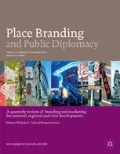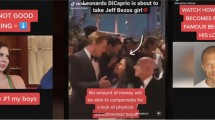Abstract
Two months after the start of Russia’s full-scale invasion of Ukraine on February 24, 2022, Ukraine’s government launched a major nation-branding initiative, which has come to be known as the Brave Campaign. This is, arguably, the first instance of a state using brand communication as a strategic tool in a war. The campaign also marks a significant departure from Ukraine’s previous nation-branding messages. Drawing on critical discourse theory, this essay considers why this change in messaging strategies was possible and what it signals about the larger geopolitical and ideological context within which the Russia–Ukraine war is being fought. The essay concludes by posing a set of new questions for future research on public diplomacy and nation branding, prompted by the events of this war.


Similar content being viewed by others
Notes
Arguably, the campaign introducing this slogan was Ukraine’s first full-fledged nation-branding effort, developed on occasion of the country’s hosting of the 2012 European soccer championship (Ståhlberg and Bolin 2016).
References
Aronczyk, Melissa. 2013. Branding the nation: The global business of national identity. Oxford: Oxford University Press.
Banda. 2022. Ukrainian bravery looking straight on the Russian Embassy in Berlin, Germany. @Banda Agency on Twitter. https://twitter.com/BandaAgency/status/1543936625826201600.
Baumann, Mario. 2020. “Propaganda fights” and “disinformation campaigns”: The discourse on information warfare in Russia-West relations. Contemporary Politics 26 (3): 288–307.
Bolin, Göran. 2006. Visions of Europe: Cultural technologies of nation-states. International Journal of Cultural Studies 9 (2): 189–206.
Dolea, Alina. 2018. Public diplomacy as co-constructed discourses of engagement. In The handbook of communication engagement, ed. Kim A. Johnston and Maureen Taylor, 331–345. Wiley-Blackwell: Hoboken.
Entman, Robert. 2008. Theorizing mediated public diplomacy: The U.S. case. The International Journal of Press/Politics 13 (2): 87–102.
Fukuyama, Francis. 2022. A country of their own. Foreign Affairs, March 1. https://www.foreignaffairs.com/articles/ukraine/2022-04-01/francis-fukuyama-liberalism-country.
Kaneva, Nadia. 2011. Nation branding in post-Communist Europe: Identities, markets, and democracy. In Branding post-Communist nations: Marketizing national identities in the “new” Europe, ed. Nadia Kaneva, 3–22. New York: Routledge.
Kaneva, Nadia. 2017. The branded national imagination and its limits: Insights from the post-socialist experience. Strategic Review for Southern Africa 39 (1): 116–138.
Kaneva, Nadia. 2018. Simulation nations: Nation brands and Baudrillard’s theory of media. European Journal of Cultural Studies 21 (5): 631–648.
Keating, Vincent, and Katarzyna Kaczmarska. 2019. Conservative Soft Power: Liberal soft power bias and the “hidden” attraction of Russia. Journal of International Relations and Development 22: 1–27.
Meaker, Morgan. 2022. How Ukraine is winning the propaganda war. Wired, June 13. https://www.wired.com/story/ukraine-propaganda-war.
Panizza, Francisco, and Romina Miorelli. 2013. Taking discourse seriously: Discursive institutionalism and post-structuralist discourse theory. Political Studies 61 (2): 301–318.
Roselle, Laura, Alister Miskimmon, and Ben O’Loughlin. 2014. Strategic narrative: A new means to understand soft power. Media, War and Conflict 7 (1): 70–84.
Ståhlberg, Per, and Göran. Bolin. 2016. Having a soul or choosing a face? Nation branding, identity and cosmopolitan imagination. Social Identities 22 (3): 274–290.
Zelenskyy, Volodymyr. 2022. Being brave is our brand; we will spread our courage in the world, April 7. https://www.president.gov.ua/en/news/buti-smilivimi-ce-nash-brend-budemo-poshiryuvati-nashu-smili-74165.
Author information
Authors and Affiliations
Corresponding author
Additional information
Publisher's Note
Springer Nature remains neutral with regard to jurisdictional claims in published maps and institutional affiliations.
Rights and permissions
Springer Nature or its licensor holds exclusive rights to this article under a publishing agreement with the author(s) or other rightsholder(s); author self-archiving of the accepted manuscript version of this article is solely governed by the terms of such publishing agreement and applicable law.
About this article
Cite this article
Kaneva, N. “Brave Like Ukraine”: A critical discourse perspective on Ukraine’s wartime brand. Place Brand Public Dipl 19, 232–236 (2023). https://doi.org/10.1057/s41254-022-00273-3
Revised:
Accepted:
Published:
Issue Date:
DOI: https://doi.org/10.1057/s41254-022-00273-3




